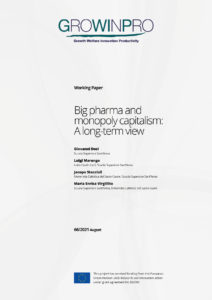Are IPRs institutions meant to foster innovative activities or conversely to secure appropriation and profitability? Taking stock of a long-term empirical evidence on the pharmaceutical sector in the US, we can hardly support IPRs intended as an innovation rewarding institution. According to our analysis, pharma patents have constituted legal barriers to protect intellectual monopolies rather than an incentive and a reward to innovative efforts. Patenting strategies appear to be quite aggressive in extending knowledge borders and enlarging the space protected from the possibility of infringements. This is also witnessed by the fact that patent applications are very skewed in the covered trade names and patent thickness expands over time. Conversely, the number of patents protecting new drugs approved by the FDA which draw upon government-sponsored research – as such a mark for quality – falls. Firm-level analysis on profitability confirms strong correlation, restricted to listed pharmaceutical firms, between patent portfolio and profit margins.

 Big pharma and monopoly capitalism: A long-term view
Big pharma and monopoly capitalism: A long-term view